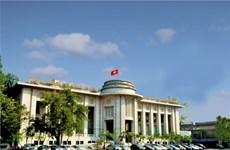Nation on target to hit GDP growth target
The country's economic growth will improve in the next quarter and the
5.8 percent GDP growth target will likely be met thanks to the
Government's measures to increase aggregate demand, according to the
National Financial Supervisory Committee.
The country's economic growth will improve in the next quarter and the
5.8 percent GDP growth target will likely be met thanks to the
Government's measures to increase aggregate demand, according to the
National Financial Supervisory Committee.
Growth will improve next quarter in the wake of an interest rate cut and Government bond investment increase that support aggregate demand, the committee said, adding that GDP was expected to continue rising for the next three quarters after a surge of 4.96 percent in Q1.
The GDP growth rate of 4.96 percent in Q1 was higher than the same period of the past two years thanks to the recovery of the agriculture, forestry, fishery, construction and industrial sectors.
After a long decline that lasted from the beginning of 2011 until Q2 last year, GDP has steadily increased. Improved results were also seen in the macro-economy, the committee said.
The manufacturing and processing sector has risen since Q2 last year and continuously improved 7.3 percent year on year in Q1 while the country's Purchasing Managers' Index (PMI) reached 52.1, pointing to a fifth consecutive monthly improvement in business conditions in the sector – the second-strongest in the survey's history, just shy of the record achieved in April 2011.
High export growth in Q1 also contributed to the optimistic forecast. The country gained a trade surplus of more than 1 billion USD in Q1, the highest level since 2010.
Inflation was also controlled at only 0.8 percent in Q1, the lowest rise since 2005. The inflation slowdown led to an interest rate cut that helped credit growth and eased firms' difficulties.
However, the committee noted that aggregate demand improvements remained slow. Excluding inflation, the retail sale value of goods and services in Q1 rose only 5.1 percent, not much higher than the rates of 5 percent in Q1 2012 and 4.5 percent in Q1 2013.
To meet the GDP growth target, the committee recommended that in addition to economic restructuring for long-term growth, the Government should pay attention to supporting aggregate demand, boosting consumption and aiding farmers and businesses through interest rate cuts and bank credit access.
It was also necessary to speed up the disbursement of investment capital from the State budget and Government bonds, the committee said.-VNA
Growth will improve next quarter in the wake of an interest rate cut and Government bond investment increase that support aggregate demand, the committee said, adding that GDP was expected to continue rising for the next three quarters after a surge of 4.96 percent in Q1.
The GDP growth rate of 4.96 percent in Q1 was higher than the same period of the past two years thanks to the recovery of the agriculture, forestry, fishery, construction and industrial sectors.
After a long decline that lasted from the beginning of 2011 until Q2 last year, GDP has steadily increased. Improved results were also seen in the macro-economy, the committee said.
The manufacturing and processing sector has risen since Q2 last year and continuously improved 7.3 percent year on year in Q1 while the country's Purchasing Managers' Index (PMI) reached 52.1, pointing to a fifth consecutive monthly improvement in business conditions in the sector – the second-strongest in the survey's history, just shy of the record achieved in April 2011.
High export growth in Q1 also contributed to the optimistic forecast. The country gained a trade surplus of more than 1 billion USD in Q1, the highest level since 2010.
Inflation was also controlled at only 0.8 percent in Q1, the lowest rise since 2005. The inflation slowdown led to an interest rate cut that helped credit growth and eased firms' difficulties.
However, the committee noted that aggregate demand improvements remained slow. Excluding inflation, the retail sale value of goods and services in Q1 rose only 5.1 percent, not much higher than the rates of 5 percent in Q1 2012 and 4.5 percent in Q1 2013.
To meet the GDP growth target, the committee recommended that in addition to economic restructuring for long-term growth, the Government should pay attention to supporting aggregate demand, boosting consumption and aiding farmers and businesses through interest rate cuts and bank credit access.
It was also necessary to speed up the disbursement of investment capital from the State budget and Government bonds, the committee said.-VNA













